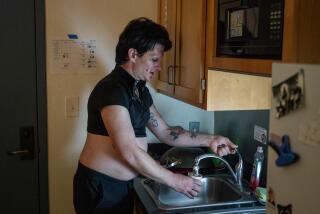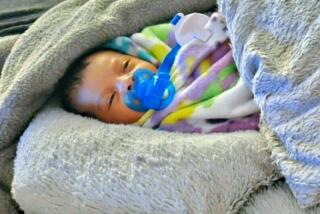Fighting to Keep Spousal Abusers From Their Kids
- Share via
As she stroked the cheek of her 16-month-old son, Robin said she can’t help but think of other hands, those of the child’s father, choking and punching her when she was pregnant with their son.
The beating is long over but she faces another battle: The man who assaulted her, now in prison for that crime and others, is fighting for shared custody of the child when he is freed this fall. Robin, who did not want her last name revealed, believes the man should forfeit all rights as a father.
It is a war Robin never expected to have to fight and one that is proving difficult to win.
Because California law protects the custody rights of both parents, it is rare for the courts to terminate a parent’s relationship with his or her child.
Robin’s custody case is not unusual. O.J. Simpson, for example, drew attention to the state’s child custody laws after securing the right to raise his two children after being found responsible in civil court for the death of their mother. Earlier, he had been cleared of criminal wrongdoing.
As a result of her own struggle, Robin has joined a larger effort to change the system. She is supporting several proposed changes in the state Legislature, including a bill that would make it more difficult for batterers to gain custody of their children.
So between raising her child and working as a law firm receptionist, Robin plans her next batch of letters, her next round of phone calls, her next stab at changing a system based on shared parenting.
“I just want the wrongs to be right,” said the Calabasas High School graduate. “This system doesn’t work for the victim. It doesn’t work for me.”
Until now, Robin has been waging her fight quietly. And with trepidation.
“My biggest fear is that he’ll shoot me on my way into the courthouse,” she said at her group-therapy session for victims of domestic violence. “This is my life. This is my son’s life. No one else is going to do this. I have to do it.”
Robin’s ex-boyfriend was contacted in prison for this article, but he declined to be interviewed by telephone. Prison officials bar reporters from interviewing inmates in person.
Last summer, a judge granted joint legal custody of the child during a mediation hearing. But soon after, the boy’s father was sentenced to state prison, and Robin began seeking sole custody.
Navigating the legal system alone--she cannot afford an attorney--Robin says she feels once again like a victim.
State laws guiding judges in custody cases consider continuous contact with both parents to be best for children. As a result, courts are more likely to grant joint custody, giving one parent physical custody and the other visitation rights, lawyers say.
“The law is not such that an individual who battered his wife suddenly does not have custody of his children,” said Sorrell Trope, who practices family law in Los Angeles. “Courts are almost rubber-stamping joint legal custody.”
Said Nancy Lemon, who teaches about domestic violence law at UC Berkeley’s Boalt Hall: “The courts don’t seem to be paying attention to domestic violence. Fathers [who are batterers] are getting custody at pretty high rates.”
Of 150 Southern California divorce cases studied by professors at Cal State San Bernardino, men who were accused of spousal abuse were no less likely to win custody cases than fathers with no such allegations against them. More men fought for custody in divorce cases in which domestic violence was alleged, the study found.
“The violence was apparently not a factor considered by the court,” said Geraldine Butts Stahly, who co-authored that study.
Groups that lobby against changes in custody laws, including fathers’-rights organizations, say spousal abuse should not be considered during custody disputes.
“I’d like to know what that has to do with children,” said Vertner Vergon, founder of Fathers of America, who lobbied for joint custody laws. “I know many men who have hit their wives and would kill anyone who touched their kids.”
But advocates for domestic violence victims and some lawyers say it is common for batterers to fight for custody as another means of provoking their mates.
“The kids are just pawns,” said Gail Pincus, director of the Domestic Abuse Center in Northridge. “Most of these guys aren’t interested in parenting.”
It is a topic frequently discussed at Robin’s weekly group-therapy session. One woman shares custody of her baby with the man who physically abused her. The couple swaps their daughter several times a week at the San Fernando police station, where the 20-year-old mother feels safe.
“I don’t think the lawyers realized the level of violence,” she said softly. “They say, ‘Just because he was abusive to you doesn’t mean he’ll be the same with his daughter.’ It’s just my word against his.”
That is exactly what Assemblywoman Sheila Kuehl (D-Santa Monica) wants to change. Her legislation, approved by the state Assembly and awaiting a state Senate hearing, would put the burden on domestic abusers to prove they can be suitable parents.
Without the law, “judges are handing down death sentences from the bench,” said Lynn Moriarity, who runs the Family Violence Project in the San Fernando Valley. “It’s an ongoing, terrible problem for women.”
Said Kuehl: “I think it’s terrible when the justice system revictimizes the victim by forcing her to prove that this violent man shouldn’t have custody of a child.”
Proof, Robin says, is not a problem. She carries files crammed with police reports, temporary restraining orders and court documents with photographs of her bruises and black eyes.
Experts in spousal abuse, including professors, lawyers and shelter directors, say Robin’s experiences could be a chapter in a textbook on domestic violence. The violence typically escalates--from verbal to physical--and continues throughout pregnancy until, finally, the woman flees. And returns. And leaves again.
That pattern tends to continue until she either stays or leaves permanently, experts say.
Her relationship did not start out badly, Robin recalls. After they began dating three years ago, the couple, both in their 20s, moved to a Chatsworth apartment. Life together was fun, easygoing, she said.
It changed. He grew increasingly suspicious when she was late from work, and he would accuse her of seeing other men, Robin said.
Then, she said, he began to beat her.
“He always went for my neck. He always pulled my hair. I had bumps all over my head.”
When she became pregnant, it only got worse, she said. He hit and threatened her more often, sometimes shouting that the baby was not his.
Robin’s obstetrician eventually became so concerned about her condition that she took pictures of the bruises and filed a police report. The doctor ordered two months of bed rest to ensure the baby’s health.
That was the end for Robin.
After she had the baby, she spent the next two months shuttling between the homes of her divorced parents.
While she stayed with her parents, she said, her boyfriend kept calling and threatening her. It didn’t take long before her parents grew angry--and scared.
“It was a real nightmare,” said her father, Frank. “More so for her, but for us as well.” Fearing for her family’s safety, Robin took a leave of absence from work and moved into a shelter for battered women. She stayed more than a month--spending her first Mother’s Day there.
Armed with a temporary restraining order and determined to try to gain sole custody of her son, Robin moved back to her father’s house and began the legal proceedings.
A Van Nuys court commissioner recently ordered the couple to attend a hearing together in the fall--when Robin’s ex-boyfriend is released from prison.
Her eyes welling with tears, Robin said, “I’m scared to death.”
More to Read
Sign up for Essential California
The most important California stories and recommendations in your inbox every morning.
You may occasionally receive promotional content from the Los Angeles Times.










